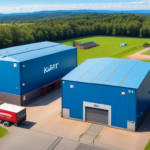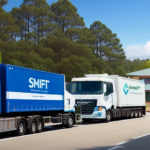Introduction to WestRock and Smurfit Kappa
In the highly competitive packaging industry, WestRock and Smurfit Kappa have established themselves as two of the leading global players. Both companies are vying for a larger market share, driving innovation and sustainability in their operations. This article delves into the history, product offerings, financial performance, and future prospects of both companies, alongside an analysis of WestRock's proposed acquisition of Smurfit Kappa.
Company Histories and Backgrounds
WestRock
Founded in 2015 through the merger of MeadWestvaco and RockTenn, WestRock is headquartered in Atlanta, Georgia. With over 320 manufacturing facilities and more than 50,000 employees worldwide, WestRock offers a diverse range of paper and packaging solutions, including paperboard, containerboard, corrugated packaging, and consumer packaging solutions.
Smurfit Kappa
Established in 1934 in Dublin, Ireland, Smurfit Kappa has grown through numerous mergers and acquisitions to become a major European-based packaging company. Operating in 35 countries with over 46,000 employees, Smurfit Kappa specializes in paper-based packaging solutions such as corrugated containers, folding cartons, and bags.
Market Share and Industry Presence
Global Packaging Market Overview
According to a Smithers Pira report, the global packaging market was valued at approximately $851 billion in 2020, with corrugated packaging holding the largest share.
WestRock's Market Position
WestRock holds approximately 17% of the North American corrugated packaging market, making it one of the largest producers in the region. The company's strategic investments in sustainable packaging have further solidified its market position.
Smurfit Kappa's Market Position
Smurfit Kappa commands a 12% market share in Europe and 8% in Latin America. The company's strong emphasis on sustainability and innovation has enabled it to maintain a competitive edge in these regions.
Product Offerings and Innovations
WestRock's Product Portfolio
WestRock offers a comprehensive range of products including:
- Corrugated containers
- Folding cartons
- Consumer packaging solutions
- Specialty chemicals for paper production
- Packaging machinery and automation solutions
The company's investment in digital printing and automation technologies enhances efficiency and product quality.
Smurfit Kappa's Sustainable Solutions
Smurfit Kappa focuses on sustainable packaging solutions with products such as:
- Corrugated containers
- Folding cartons
- Bags
- Recyclable and reusable packaging options
Innovative tools like their 3D packaging design tool and virtual reality packaging simulator allow customers to visualize and optimize their packaging designs.
Financial Performance Comparison
WestRock Financials
In 2020, WestRock reported revenues of $16.2 billion and a net income of $383 million. The company's strategic cost-cutting measures and supply chain optimizations have contributed to its robust financial performance.
Smurfit Kappa Financials
Smurfit Kappa reported revenues of €8.5 billion (approximately $10 billion USD) and a net income of €362 million (approximately $432 million USD) in 2020. The company's "Fit to Win" program focuses on enhancing efficiency and reducing costs across its operations.
WestRock's Acquisition Bid for Smurfit Kappa
In early 2018, WestRock made an unsolicited bid to acquire Smurfit Kappa for approximately €8.6 billion ($10.2 billion USD). The acquisition aimed to expand WestRock's presence in Europe and Latin America and strengthen its global market position. However, the bid was rejected by Smurfit Kappa's board due to concerns over company valuation and potential job losses.
Regulatory Challenges
The proposed acquisition faced significant regulatory scrutiny, particularly under European Union competition law, which restricts mergers that could lead to a dominant market position. These regulatory hurdles played a crucial role in the rejection of the bid.
Impact and Future Outlook
Industry Impact
Had the acquisition been successful, it would have reshaped the global packaging industry by creating a more formidable competitor against giants like International Paper and DS Smith. The combined resources and expertise would likely have driven significant innovation and market consolidation.
Future Strategies for WestRock and Smurfit Kappa
Following the rejection, Smurfit Kappa has focused on strategic investments totaling €1.6 billion to expand operations and enhance technological capabilities. WestRock continues to pursue growth through acquisitions, such as its $4.9 billion acquisition of KapStone Paper and Packaging Corporation.
Sustainability Initiatives
Both companies are committed to sustainability:
- WestRock aims to reduce greenhouse gas emissions by 30% by 2030 and invest in renewable energy sources.
- Smurfit Kappa has pledged to make all its packaging recyclable or reusable by 2025 and has been recognized for its sustainable practices by organizations like Corporate Knights.
Conclusion
While WestRock's acquisition bid for Smurfit Kappa was ultimately unsuccessful, both companies continue to thrive independently by focusing on innovation, sustainability, and strategic growth. The packaging industry remains dynamic, with both WestRock and Smurfit Kappa poised to lead through their respective strengths and commitments to sustainable practices.




















